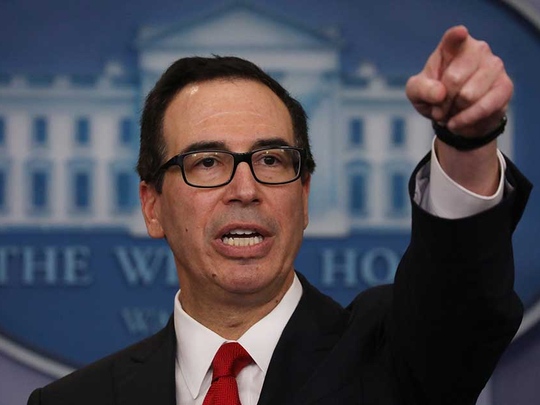
Washington: Steven Mnuchin quips that he uses super powers to avoid breaching the debt ceiling, has speed-dated dozens of fellow finance ministers fretting about the Trump administration’s protectionist tilt, and has received a Ph.D. in sanctions during his first 2 1/2 months as US Treasury secretary.
That may have been the easy part.
Now, the former Hollywood financier and regional banker is being thrust into the spotlight to accomplish what no one has managed since Ronald Reagan was president: overhauling the tax system. A political newbie with no experience in the legislative process, Mnuchin needs to unite lawmakers behind plans for deep tax reductions for a chance at his ambition of being remembered for firing up the economy.
“This is gonna be the biggest tax cut and the largest tax reform in the history of our country and we are committed to seeing this through,” Mnuchin said Wednesday before revealing the broad principles of a plan the White House wants enacted this year.
At a White House briefing, Mnuchin, alongside White House economic adviser Gary Cohn, failed to produce any legislative text to build on, but did provide a list of goals for reform. The main thrust involves tax cuts for businesses and individuals, and a simpler process for filers, as part of plan that depends on the compounding effect of economic growth to make up for lost revenue.
Mnuchin and Cohn, who briefed key Republicans late Tuesday, pulled together the 12-point outline after President Donald Trump surprised administration officials on Friday by saying in a media interview that a plan would be unveiled in five days.
Repatriation of overseas tax revenue
The pair presented a one-page document with details on reducing the number of tax brackets for individuals, cutting the tax on corporations to 15 per cent from 35 per cent and imposing a one-time tax on about $2.6 trillion (Dh9.5 trillion) in earnings that American firms have parked overseas.
Yet they didn’t offer much substance to a strategy that the administration had been trumpeting, with Cohn calling basic questions on repatriation of overseas tax revenue “micro-details” that the administration isn’t yet prepared to answer.
Investors were underwhelmed by the tax plan announcement. The S&P 500 Index climbed above its closing record as Mnuchin outlined the plan, but later gave up half of the advances. The dollar pared its rise and Treasuries extended gains in the immediate aftermath of the presentation.
In Congress, Republicans and Democrats had a subdued reaction, saying they will wait for more details from the administration before reaching any conclusions about Trump’s plan. Coordination between the White House and Republicans in Congress about tax policy has been fractious, with House and Senate members complaining that they are routinely surprised by announcements.
Tax package
Lawmakers on both sides said they were withholding support or opposition until more specifics emerge.
“It’s tough to call this new proposal from the Trump administration a plan given its lack of detail, but what’s clear is that it will explode the national debt and make it impossible for our country to invest in our future,” said John Yarmuth, a Kentucky Democrat and ranking member of the House Budget Committee.
John Cornyn, a Republican Senator from Texas, said he wants to wait to study the whole tax package: “I like low tax rates but I don’t know how we pay for it. That’s the question, and what the other provisions are going to be.”
Trump’s unscripted leadership style may be one of the biggest obstacles for Mnuchin, whose public appearances have been well-choreographed. The 54-year-old Treasury chief spent the past few weeks laying the groundwork for the administration’s tax policy, including discussing the proposals in an interview with International Monetary Fund Managing Director Christine Lagarde at the fund’s spring meetings this month.
Mnuchin may have a hard time managing Trump’s expectations. The Treasury secretary has said he wants his legacy to be that of driving economic growth, and he’s regularly reminded of his mandate: A framed copy of a newspaper article announcing him as Trump’s choice as Treasury chief hangs on his office wall in the Treasury Department, with a signed note to “Steve” — that mentions “5% GDP.”
It won’t be an easy task: A government report due out Friday is expected to show gross domestic product expanded 1 per cent in the first quarter.










